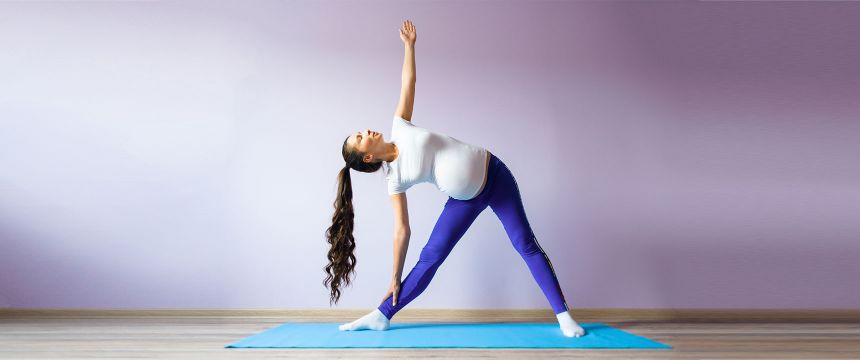Many pregnant women do not exercise because they think it may be harmful for the pregnancy. Studies have shown that exercise is safe for the mother and the developing baby.1 In fact for most healthy pregnancies, even vigorous intensity exercise in the third trimester is safe.2 More importantly, exercise offers many benefits like appropriate maternal and fetal weight gain, low incidence of cesarean section, gestational diabetes, high blood pressure, preterm birth and high incidence of vaginal delivery.3 Make sure to consult your doctor before starting any exercise during pregnancy.
What exercises should you do during pregnancy?3

Walking, stationary cycling, aerobic exercises, dancing, resistance exercises, stretching exercises and water aerobics are safe and beneficial during pregnancy. You can also do swimming, jogging, running, yoga and Pilates. Activities like boxing and horse riding and adventure sports like sky diving and scuba diving are considered high risk and should be avoided.
How much should you exercise?3
There are guidelines for the amount and frequency of exercise during pregnancy. You can start exercising in the first trimester and continue until delivery. Target 30 to 60 minutes of moderate intensity exercise at least 3-4 days a week. You can exercise daily if you are up to it. Make sure that you are well hydrated before exercising and you can speak during the exercise. Do not exercise lying on your back.
When to stop?3
Your body will give you certain warning signs if something is wrong. Stop exercising if you experience vaginal bleeding, shortness of breath before activity, dizziness, headache, chest pain, muscle weakness, calf pain or swelling, preterm labor, reduced fetal movements and loss of amniotic fluid.
Also, do not exercise if you have heart disease, severe anemia, vaginal bleeding, high blood pressure or if you are carrying twins or multiples.
Exercise is good. But remember, safety first.
Reference:
1Hinman SK, Smith KB, Quillen DM, Smith MS. Exercise in Pregnancy: A Clinical Review. Sports Health. 2015;7(6):527-531. doi:10.1177/1941738115599358.
2Beetham KS, Giles C, Noetel M, Clifton V, Jones JC, Naughton G. The effects of vigorous intensity exercise in the third trimester of pregnancy: a systematic review and meta-analysis. BMC Pregnancy Childbirth. 2019;19(1):281. doi:10.1186/s12884-019-2441-1.
3Berghella V, Saccone G. Exercise in pregnancy! Am J Obstet Gynecol. 2017;216(4):335-337. doi:10.1016/j.ajog.2017.01.023.







